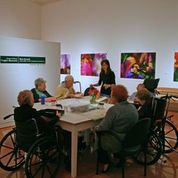
Ready to be frightened by the future? Please don’t stress about a zombie apocolypse, because it looks like the next big thing to fear is Alzheimer’s disease. Due to the demographic shift of an aging species, the predictions are that by mid century, humans over the age of 65 will outnumber the amount of children living on the planet. Among this population, The World Health Organization predicts that diseases related to memory loss will triple, to reach 115 million people worldwide by mid century. Does this number shock you? It should. Sadly, there is no cure for Alzheimer’s disease.
People diagnosed with Alzheimer’s disease and their caregivers often travel down a seemingly tragic path, as able bodied and independent adults slowly lose the ability to function at their optimal level of living. The choice for family members or loved ones is to follow them on their devastating path or create a new reality of living in the moment.
As families and caregivers move beyond the grief that accompanies this disease, often there is an opportunity for a new way of living. Once a person with dementia loses their ability to perseverate on the past or contemplate the future, there is a freedom with living in the present tense. While outsiders often find memory care units tragic and frightening, insiders/caregivers all recognize the surprising beauty of living in the persent tense. In well run facilities, and when stress levels are diminished, really the primary emotion flowing in these places is love.
As an art therapist who has worked with the dementia population for the past seventeen years, my observation and experience is that what happens in “the moment” can have a residual impact on the rest of the “moments” in a person’s day. For years, I have observed people with dementia respond well to an environment of integrity. My fledging theory I am creating for working with families with dementia is called, Integrity Systems Theory.
Webster’s dictionary defines integrity as: the state of being whole and undivided. When the entire system supporting the person with Alzheimer’s shifts their focus from what was to what is, there is surprising opportunity for creating moments of integrity, and FIND the whole person who stills resides behind the memory loss. The result? Lowered stress levels all around, making everyone’s day to day living slightly less stressful.
Art making and listening to music are fantastic avenues for reaching people who seem to have disappeared into their disease. Please take the time to watch the riveting documentary on the power of music/creativity with this population: Alive Inside.